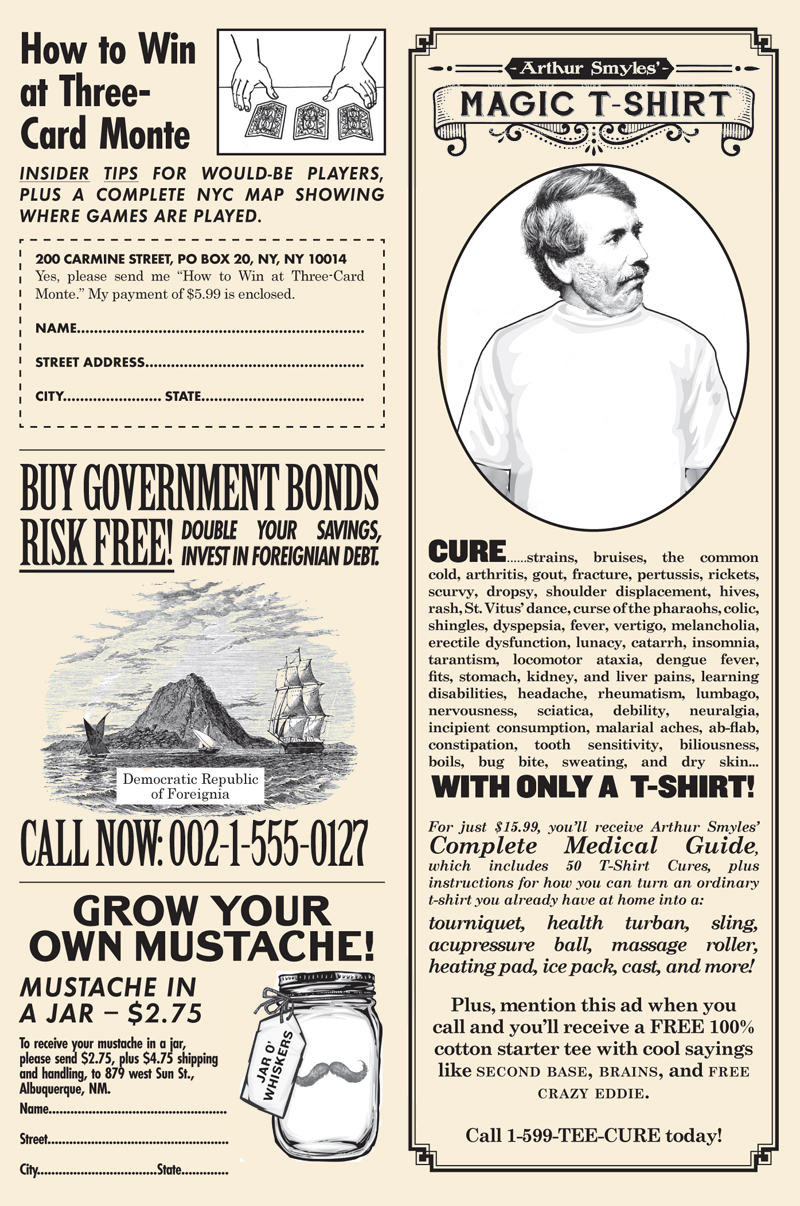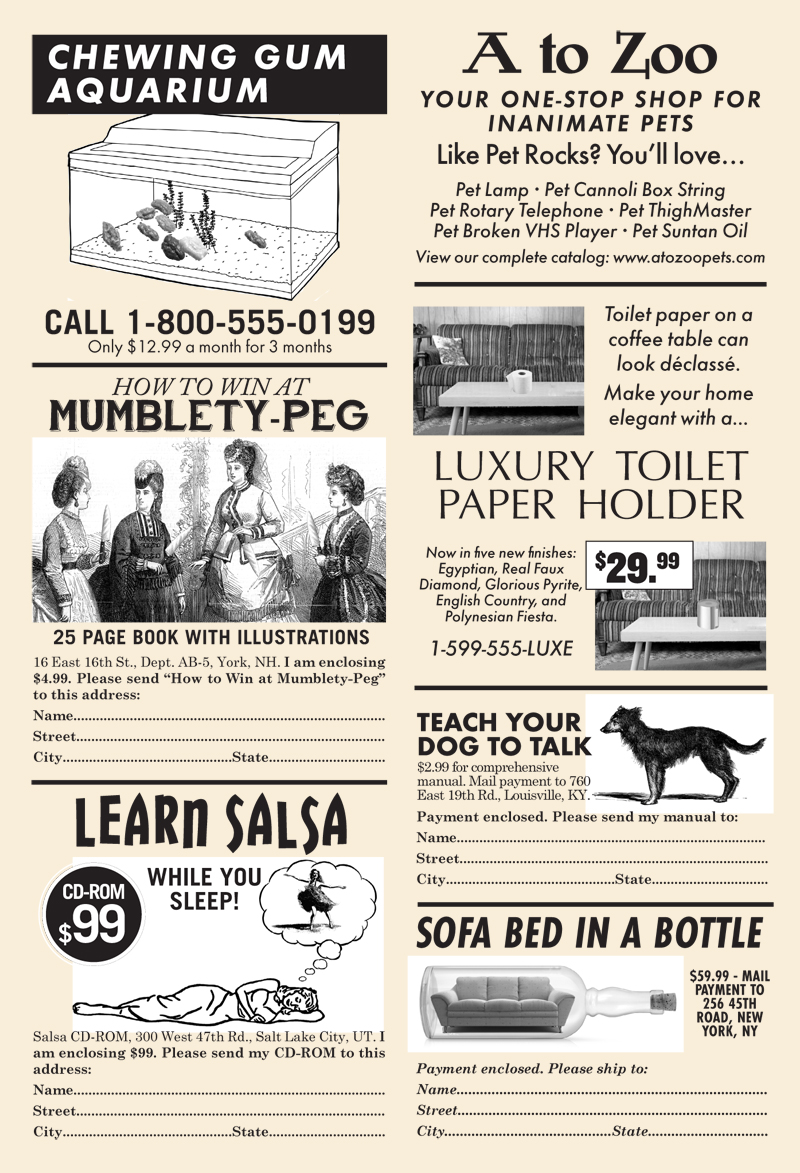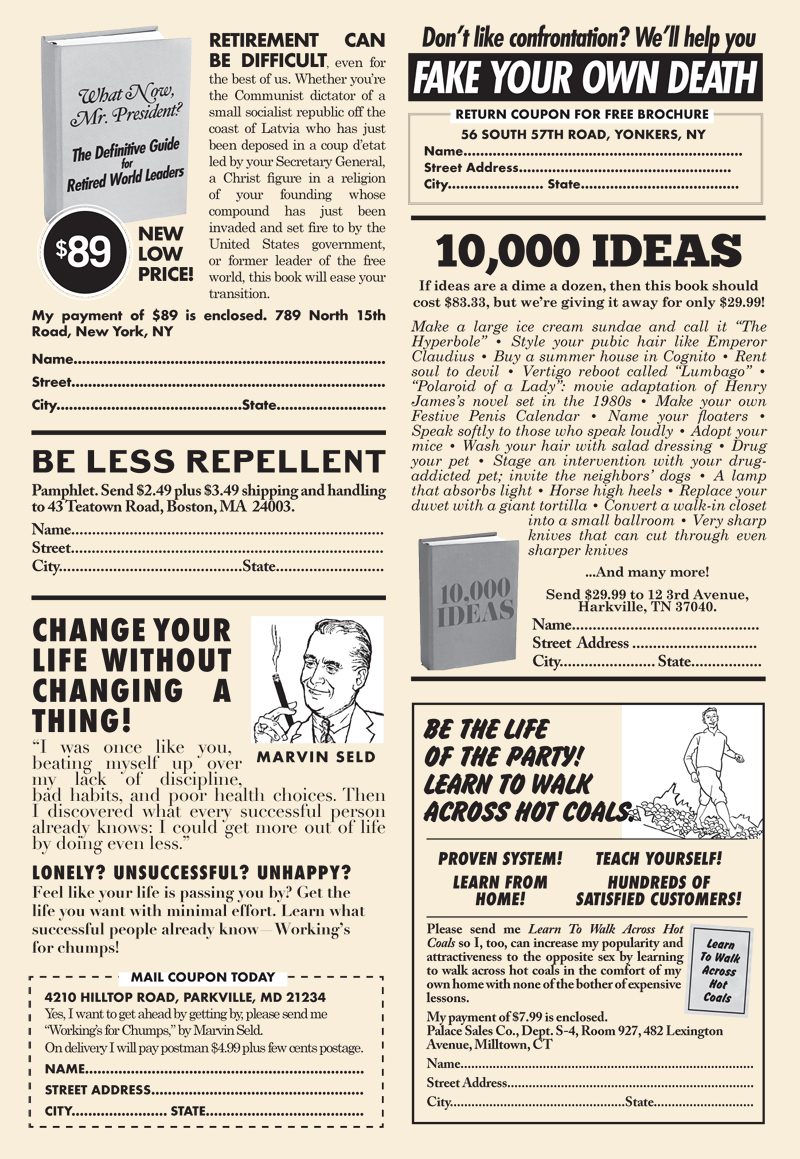
Yesterday when Sam kissed me, I remembered where I left my keys. They’d been missing a few days—I’d had to call a locksmith—when, with Sam’s lips touching mine, I had a revelation and cried out, “Eureka!”
I don’t know where I got the word “eureka” from. I’d never said “eureka” before, but there it tumbled out, as if it were the most natural thing. Sam thought I was calling him “Eureka” and said he preferred some of the names I’d given him previously. “I like ‘Conan the Librarian’ better,” he said, before kissing me again.
I’m absent-minded and more than once have tried to fit a metro card in the front door, swiped my lip gloss at the subway turnstile, and brought keys to my lips when looking in the bathroom mirror, which is, I guess, how they ended up in the medicine cabinet. But who knows? I’ve a terrible memory. Just like my dad.
“I remember what’s-his-name” is the setup of my dad’s favorite joke. He’ll say the line as if about to begin a story and then stop; the setup is also the punch line. He repeats this joke fairly often, every time as if it were the first time, and I laugh every time, too, though sometimes I can’t remember why it’s funny.
If I can’t remember some things, others I can’t forget: Running on the beach with my father when I was six. We were going so fast; I was afraid my legs weren’t long or quick enough, that I’d fall, and I remember looking up at him, as he laughed and pulled my hand and said faster and we were flying and my feet, I swear, were barely touching the ground.
I also forget words. Last summer I was helping my father in the garden, and I wanted to say, “Hand me the hose,” but couldn’t remember the word for “hose,” so I stood there stammering, until finally I gave up and pointed toward “the snake that spits water.”
He immediately understood, as we share the same affliction. He’s asked me numerous times for a “writing stick” when he wanted a pencil and sometimes asks for “brown champagne” when the Coca-Cola is on the other end of a lunch table. People, places, and things — it’s nouns that give us the most trouble. Grasping at metaphors when our memories fail, sometimes our conversations become inadvertently poetic: “Dad,” I’ll say entering the living room where he’s watching CNN, “Mom says ‘the night fuel’ is ready.”
My mother, forgetful in her own way, replaces most of her nouns with the phrase “the thing.” “Pass me the thing.” Or, “We’re going to the thing.” Recently she advanced to replacing verbs as well, so that sometimes whole sentences will consist of nothing but “the thing.” “The thing the thing in the thing,” she’ll say to my father, who will know exactly what she means: “Bring the groceries in from the garage.” Forty years of marriage is its own language.
Ironically, my mother is named Calliope, after the muse that inspired Homer. Each of the nine muses was assigned to a different art, and my mother’s namesake worked with words. “Sing in me, Muse,” Homer says at the beginning of The Odyssey, for the Greeks believed inspiration was mostly listening. The writer, a conduit, did not invent but record whatever the muse told him. To imagine, in ancient Greece, was really to recall.
In fact, memory gave birth to imagination rather literally, as the muses were the daughters of Mnemosyne, the goddess of memory, whose name was also given to a river in Hades—Lethe’s rumored counterpart. While dead souls drank from Lethe to forget their lives, one might alternately drink from Mnemosyne and remember everything.
In Greek, the word lethe means “forgetfulness.” It is the root word of aletheia, meaning “truth,” which translates to “unforgetfulness,” suggesting that knowledge, even self-knowledge, exists someplace outside of oneself, and so could be misplaced, like keys. Thus, the common phrase “finding oneself” tells of a deep, perhaps unconscious belief that we do not become but uncover who we are, that the future is pursued nostalgically.
Another myth, not exclusively Greek, offers that every child upon his birth holds within him all the wisdom of the world, until an angel visits and, pressing a finger to the child’s lips, impels him to keep it all secret. “Shhhhh,” the angel says, and like that the child forgets. That place in the middle of our upper lip that dips down is the scar and symbol of what we’ve forgotten, reminding us that wisdom is not acquired but recalled.
The Greeks felt that spot, the philtrum, to be the body’s most erogenous zone, so they called it philein, meaning “to love.” In countless stories since, love and truth are thus entwined. Only a kiss can restore the frog to his true form of prince. Forget the eyes, forget the soul; the lips are the door to memory, which can be unlocked or sealed, as they say, with a kiss.
* * * *
In De Oratore, Cicero describes a mnemonic device called “the Memory Palace,” which requires you to imagine a physical space, a great house with many rooms, in which each of your memories can be stored. To retrieve a particular memory, you’ve only to enter that room and go to that place where you’ve left it.
This device, used by memory champions, is a bulwark against a basic tenet of physics, which states that entropy is ever increasing. Our minds, like our homes, become messy over time; the Memory Palace untended becomes a house filled with lost things.
If you stay up late, you’ll see plenty of infomercials selling kits to improve your memory. My father, plagued by insomnia, is a connoisseur of self-improvement. Having already purchased Teach Yourself Greek!, Tony Robbins’s Unleash the Power Within, and a Total Gym that folds away to fit neatly under the bed—where it stays—he’s bought a few memory kits, too. Unfortunately, he forgets to use them; the trap of the bad memory is forgetting one’s mission to ameliorate it.
The trouble with all of these systems is that they can only improve one’s deliberate memory, so that you have first to say to yourself, “I want to remember this,” and then perform the suggested exercise upon the thing you want to remember. This method won’t help with remembering things already forgotten or remembering things one isn’t anticipating forgetting. The exercises must be employed preemptively, so that one must begin by remembering not to forget. They do nothing to solve the real problem, which is forgetting to remember in the first place.
The trickiest thing about a bad memory is that one doesn’t remember forgetting. To even know one’s forgotten requires first remembering what’s forgotten. And how can you know you’ve forgotten anything until by some accident you’re reminded? Until a person from out of your past appears before you at a party, on the sidewalk, at a restaurant, in the elevator at your new office, and says, “You look familiar,” and cocks his head and asks where you’re from, then squints and says, “Eureka!” Until he reminds you that you were inseparable in second grade—“Don’t you remember?”—and goes on reminding you of a field trip your class took on a fishing boat off Sheepshead Bay, how the two of you got in trouble with the teacher, “Mrs. What’s-her-name, remember her?” for spitting over the side.
And you don’t remember, but then you start to. “Oh, yes,” you say, after more details jog your memory. “My god, what are the chances?” And then, looking around you on the street later that day, at the faces of so many strangers, you wonder again what are the chances and are struck by an uncanny feeling—every person you see looks suddenly familiar, as if at some time long ago forgotten, you might have known them all.
Each of my dad’s mnemonic kits offers variations on a few classic memory exercises. The basic strategy is to strengthen memories through association. If you meet someone at a cocktail party, for example, and you want to remember his name, try to pick out one specific thing about him. If he is wearing a red tie, say to yourself, red tie—Donald, red tie—Donald, red tie—Donald . . .
In college, I had a big crush on a Donald whose memory was great. We were in the dining hall when I confessed mine wasn’t. He insisted my memory could be great, too; it was only a matter of strategy. Eager to prove his point, he climbed on top of his chair and instructed me to memorize what he was about to say. The unusual circumstances under which I was receiving the information, he explained after, would make a lasting impression, making it impossible to forget.
When he quizzed me after ten minutes, however, I remembered nothing of what he’d said, only the way he looked when he said it—towering over me, his brown hair flopping into his eyes. I wonder if he remembers that?
* * * *
Emerging from a café following a warm spring rain, I inhale deeply, and all at once recall a similar day three years earlier; the air now is as it was then when I fled Central Park, soaking wet, having been caught in a sudden downpour. I was on a bicycle pedaling after Philip, who was up ahead, leaning into a left turn. Philip, whom I haven’t thought of in over a year. Philip, who was once so unforgettable. How could I have forgotten what’s-his-name?
A person’s memory is a complex web of associations. Mothballs remind us of grandmothers, popular songs cue up old heartbreaks, places are haunted by people we once knew, the utterance of a name can open on to a feeling, while a feeling can open backward onto a name.
But then names change, which can confuse “ex-boyfriend,” and then there is your new boyfriend, who after a year also becomes your “ex-boyfriend,” requiring the previous “ex-boyfriend” to shift down a spot and be renamed your “ex-ex-boyfriend” or your “old ex-boyfriend” or your “former ex-boyfriend,” in order to distinguish him from your “most recent ex-boyfriend.” It can get rather complicated, which is perhaps why it’s best not to use names at all.
Philip used to call me by his ex-wife’s name when we argued. “Katherine!” he’d yell. “I mean Iris.” It bothered me, but I couldn’t get too angry, as I’d done the same thing a few times myself. Just as Philip associated anger with his ex-wife, I associated love with my then-ex-boyfriend Martin.
We were in bed the first time it happened. Philip was on top when I rather affectionately cried out, “Martin!” because, as I explained after, I’d felt a sudden rush of love, a feeling I associated with Martin, who was my boyfriend for three years before Philip. “But, Philip! Martin was the furthest thing from my mind!” I insisted, for hearing his name had surprised me, too.
“If anything, you should take it as a compliment,” I went on. “Had I called you ‘chicken fingers,’ ‘tilapia,’ or ‘suitcase without wheels,’ I’d understand your anger, because I don’t much care for those things. But I really liked Martin! Don’t you see? Which means I really like you, too.”
“Katherine—I mean Iris—I don’t want to hear it!”
After much discussion, his anger subsided, and we picked up where we left off. And then, what can I say? It happened again. “Oh, Martin,” I sighed, before I caught myself and froze. He pulled away and looked at me, his eyes molten.
“I’m kidding!” I lied. “God, you’re so serious all the time!”
He glared. “Bad joke?” I asked, scrunching my face. “I remember what’s-his-name,” I said, forcing a laugh. “You know that joke?”
Philip left the room and I followed closely after, describing the symptoms of Wernicke’s aphasia.
* * * *
Aphasia is a brain disorder primarily affecting speech. The afflicted will substitute words like “blaff” for “glass,” or “coutom” for “crouton.” Sometimes called “cocktail hour speech,” it’s not nonsensical exactly, because it can still be understood, the way readers can glean meaning from Lewis Carroll’s poem “Jabberwocky.”
I’m not suggesting I have Wernicke’s, but I think it’s distinctly possible that I have Wernicke’s cousin. While Wernicke’s is caused by brain trauma, “Amatory Aphasia” results from a blow to the heart—a painful breakup or series of them—and presents as a trouble with naming romantic partners. It afflicts almost all single adults of a certain age. If you’ve dated around, you probably have it too.
That’s where “baby,” “sweetheart,” and “honey” come in. They’re pet names employed by the seasoned lover who’d never make a rookie mistake like mine, not again anyway. Had I cried out, “Baby,” the debacle with Philip might well have been avoided. When I was young, calling someone “baby” seemed vulgarly callous, as I hadn’t yet grasped that a callus serves a purpose. Just like a person with a broken knee wears a cast, a person with a broken heart calls his new lover “baby.” It’s unfortunate but for the Unemployed sometimes the heart mends imperfectly, requiring the injured to rely on a crutch. Saying “baby” is how the heart limps.
I could recall no name for the pain I felt when Philip left. And just as I’d become inadvertently poetic in my father’s garden, describing objects when their names eluded me, I went on to friends, trying to describe my terrible feelings for which no single word sufficed.
The word I was seeking was on the tip of my tongue, I felt, and so I kept talking, like that annoying guy hanging over the jukebox at your favorite bar who won’t stop hounding you about the lyrics to a song he can’t remember but which he has, nevertheless, stuck in his head. “You know that song about the girl who’s angry with the guy because he did something she didn’t like?” he goes on. “Damn! What’s it called? I’m not going to be able to stop thinking about it until I figure it out!”
If I could only name the feeling, I was sure I could let it go. “Baby, you broke my heart,” the guy says between swallows of beer beside the jukebox. “B’dm, b’dm, d’dm. It goes something like that.”
* * * *
Now I’m dating someone new. I’ve been seeing Sam for over a month and have in that time called him a variety of names: “Mr. Drummond,” “Bird Flu,” “Queequeg,” “Octopus Lips,” “Flounder Teeth,” “One Hundred Seventy-Five Pound Cake,” “Cold Cuts,” “Chief Custodian of My Loins,” as in “I hereby promote thee Sam to Chief Custodian of My Loins,” “Orange Julius,” “DDT,” “Tempur-Pedic Mattress,” “Wonderballs,” “Shostakovich,” and “Vitamin Supplement.” Pet names, alternatives to “baby” and “sweetheart.” Why not make my bandage words unique? Why not paint little drawings on each cast?
As Sam and I get closer, however, I find myself, much as before, on the verge of calling him the wrong thing. It’s strange to say, but an intimate moment in the life of an adult is often a congress of previous ones. With the ghosts of one’s past crowding around you in the present, a kiss is a haunted thing.
Like a song on the radio reminds you of your first slow dance; like the scent of damp grass brings back that high school pep rally; like the caress of an unseasonably warm day in winter reminds you of someone who broke your heart; like a storm of such triggers, setting off so many memories at once; like that, yesterday, with Sam inside me, all the men I’ve ever loved were all at once recalled, not because I was thinking of them, but just the opposite, because the whole of my history, everything I have ever known and since forgotten, was rising in me to mean him, Sam, whose name I could not remember.
The French call the orgasm “the little death.” Approaching the big death, the rumor goes, one’s whole life flashes before one’s eyes. It makes sense then that with my little one, all previous loves should flash before mine, so that instead of crying out, “Sam!” I nearly sang a summary of my love life so far: I love you, Joey, I mean Martin, I mean Nicos, I mean Philip, I mean Max, I mean Glen, I mean Billy, I mean Sam . . .
“’Twas brillig, and the slithy toves
Did gyre and gimble in the wabe;
All mimsy were the borogoves,
And the mome raths outgrabe.”



From DATING TIPS FOR THE UNEMPLOYED. Used with permission of Mariner. Copyright © 2016 by Iris Smyles.


